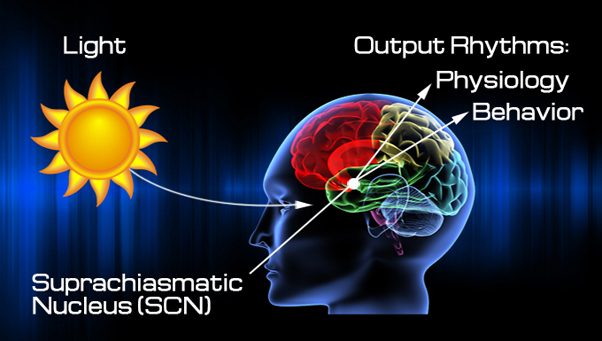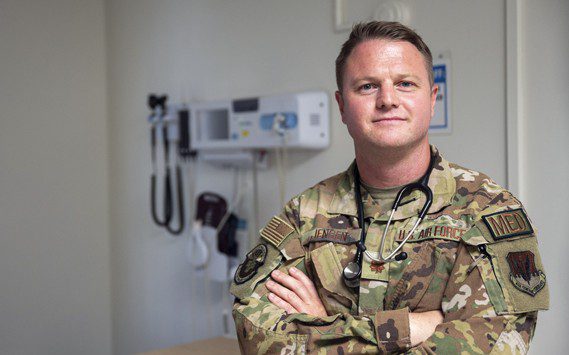“Beep. Beep. Beep,” the alarm blares. Time to get up. Do you hit snooze?
On average, we spend 33 percent of our lives asleep. When assessing your overall health, have you considered your sleep habits?
Sleep hygiene, as researchers call it, involves a variety of different behavioral practices which are necessary for quality sleep and full alertness during waking hours.
“One of the most beneficial ways to ensure a healthy lifestyle is to prioritize your sleep, the same as you do your best eating and exercise habits,” said Maj. Jaime Harvey, chief of Human Factors and Operational Safety Issues, Headquarters Air Force Safety Center. “And one of the key ways you can do that is by trying your best to maintain a regular wake and sleep pattern, every day of the week.”
The ABCs of Zzzs
Sleep allows our bodies to rest and refuel for the next day. The sleep process is complex and active. As we sleep, there is important internal restoration and recuperation taking place. A lot of the information we take in throughout the day is processed and stored while we sleep.
The sleep-wake cycle is regulated through two systems which interact and balance each other out. These two systems are known as the circadian rhythm and sleep-wake homeostasis.
The regulatory internal circadian biological clock controls the length of periods of wakefulness and sleepiness throughout the 24-hour cycle. The system of sleep/wake homeostasis helps the body track how much time we have spent awake and when it is time to sleep.
Sleep occurs in two states: NREM (non-rapid eye movement) and REM (rapid eye movement) sleep. During NREM sleep, there is a slowdown of physiological and mental activities. While in NREM, the body experiences physical restoration, hormone production and tissue repair. NREM sleep is divided into four stages. The deepest sleep occurs during stages three and four, when there is usually very little mental activity. Dreaming occurs during REM sleep, when the brain is extremely active.
Circa dian
“Circa” means approximately, and “dian,” a 24-hour period of day, are the basis for the circadian rhythm. The 24-hour circadian rhythm follows a cycle incorporating changes in physical, mental and behavioral changes, in accordance with periods of natural light and dark in our environment.
Staying in synch with the circadian rhythm includes being exposed to light first thing in the morning and going to bed at the same time every night.
“The human body thrives on routine,” Harvey explains. “When we incorporate a regular sleep/wake pattern, our bodies follow like a well-tuned orchestra, performing in synch. When sleep is off, our bodies behave like an orchestra warming up, with each component following its own rhythm, out of synch as a whole.”
Circadian highs and lows are based on the circadian rhythm, which has different peaks and dips throughout the day. On the assumption that the average person wakes up at 6 a.m. and goes to bed at 10 p.m., the circadian flow goes like this:
– Circadian low: 12 a.m. to 6 a.m.
– Circadian high: 9 a.m. to 10 a.m.
– Post lunchtime dip: 1 p.m. to 3 p.m.
– Happy hour high: a 30- to 60-minute burst of energy around sunset
– Dip: around 6 p.m.
– Lowest dip: 3 a.m. to 5 a.m.
Steps to good sleep hygiene
When considering Zzzs, remember RRR: routine, routine, routine.
Bring back bedtime. Bedtime is not just for children. Remaining cognizant of sleep time is crucial. Setting a routine bedtime can have immense effects on improving overall health.
Create a winding down routine. In preparation for bedtime, create a routine to help relax your mind. Try reading (something non-stimulating), journaling, showering or creating a to-do list for the next day.
Set a wake time. The flip side of maintaining a routine bedtime, is setting a regular wake time. A regular sleeping and waking pattern will help your body adjust to its natural circadian rhythm. Once awoken, avoid lying in bed. This helps maintain bed space as sleep space.
Use an alarm clock. Phone alarms work too but phones should be kept out of arm’s reach, and placed on “do not disturb” during sleep time. Make sure your phone is not disturbing your sleep.
Get in seven to nine hours. Adults require this amount of uninterrupted sleep each night and are only meant to be awake 16 hours a day. Lost sleep, or “sleep debt” accumulates. Unfortunately, we cannot “bank” sleep so the only way to reduce sleep debt is to get sufficient, quality rest every night.
Avoid electronics before bed. As a rule, 30 minutes before bed, avoid having “backlit” devices that give off blue light in front of your face. Blue light washes out melatonin, the natural hormone in the brain which triggers sleep. Each text answered, tweet posted and comment liked increases your exposure to blue light and contributes to disruption of melatonin. With loss of melatonin, we become more alert and enter a vicious cycle of returning to a state of wakefulness. Soon, eight hours of sleep goes down to seven, down to six and so forth.
Eat healthily, live actively. Keep in mind principles of healthy eating, active living. Maintaining a good balance of nutritious food and daily exercise can promote quality sleep.
Be aware of sleep inducing and wakefulness promoting foods. Sleep-inducing foods include: carbohydrates, pasta, corn, white breads, and potatoes. Foods for alertness include: protein, nuts and seeds, meats/cold cuts, peanut butter, cheese, eggs, fish, yogurt, and beans.
Perform a self-check. If you find yourself experiencing difficulty getting a good night’s rest, ask yourself these questions: When did you last consume caffeine? Did you exercise before bed? How long before? Did you consume a large meal before bed? Did you not have enough to eat before retiring for the night? Are you taking over-the-counter medications, vitamins, etc.? Some products may have hidden caffeine, including some daily multivitamins.
Find the culprit. Complete your self-check and take action accordingly:
– Consuming too much caffeine, or too close to bedtime? Give yourself a “caffeine cut-off” time and try to cut back by at least one caffeinated beverage.
– Exercising too close to bedtime? Exercise earlier in the day
– Having large meals before bedtime? Cut down on food intake before bed.
– Going to bed hungry? Have a light snack 30 minutes prior to bed (light carb snack such as crackers or warm milk
-Taking over-the-counter medications, vitamins, etc.? Be sure to discuss use with your health care provider.
Still experiencing difficulty sleeping?
– Learn the truth and log your sleep. Many free apps are available to provide a log of your sleep, track how restful your sleep has been and wake you up in a REM cycle so you are not groggy.
– Incorporate a meditative sound, such as “pink noise.” Pink noise layers noises on top of each other –such as rain on a tin roof– and helps to relax your mind from the worries of the day.
– Get out of bed and do something boring. Find a monotonous activity which will not get you stimulated (i.e. load the dishwasher). Keep the lights dim and remember the importance of getting out of bed while not sleeping –this practice maintains the sacredness of the bed as a place for sleep.
Look out for symptoms of underlying health issues. Problems with sleep can be signs of other health issues, such as sleep apnea or restless leg syndrome. If you experience any of the following, or other ongoing symptoms, consult your physician.
– Symptoms of Restless Legs Syndrome: Uncomfortable sensations in legs, arms or other parts of the body; irresistible urge to move legs to relieve sensations; discomfort in the legs, including an “itchy,” “pins and needles,” or “creepy crawly” sensation.
– Symptoms of sleep apnea: Chronic loud snoring, pauses during snoring, followed by choking or gasping; or rapid onset of sleepiness during quiet, inactive moments of the day.
Sleep deprivation is real. One out of three adults is sleep deprived. Inadequate sleep, or insufficient restorative sleep accumulated over time can cause physical or psychiatric symptoms and affect routine task performance. Sleep deprivation can cause memory problems, a weakening of your immune system and lead to depression. Long-term effects of sleep deprivation include a high risk of obesity, heart disease, hypertension, cancer, mental distress and stroke.
Sustained wakefulness affects performance. Going without sleep, or continuing in a sustained state of wakefulness, can have effects on performance similar to effects of alcohol consumption on cognitive function. After 17 hours of sustained wakefulness, performance decreases to a level similar to performance under a .05 BAC (blood alcohol content). After spending a full 24 hours in a continued state of wakefulness, performance decreases to a level similar to performing with a .10 BAC. The legal BAC limit for operating a motor vehicle is .08.
Fatigue can be fatal. Persistent exhaustion is a constant state of weariness, or fatigue. Fatigue reduces concentration, energy and motivation. The state of fatigue decreases a person’s cognitive abilities by 20 to 50 percent. Cognitive abilities affect everything from attention to reaction time and judgement. According to Harvey, the chance of an accident occurring increases by 400 percent after a worker is on shift 12 hours. As many as 7,500 fatalities occur each year as the result of drowsy driving. Reduced cognitive abilities increase the risk of accidents and fatal hazard. The leading cause of fatigue is inadequate amounts of sleep.
Are you on nightshift? Since we cannot flip-flop our circadian rhythm, it is important to maintain a routine. Some of the biggest accidents happen at night. Remember to remain vigilant: Double-check work, have a work buddy, or utilize break times.
Is your bed your sofa too? Col. Tracy Neal-Walden, chief of Psychological Health, Office of the Air Force Surgeon General, recommends to Airmen living in the dorms that if your bed is also your sofa, be sure to make distinctions in your routine to separate sofa and bed functions. Keep the time your bed is used as a sofa separate from the time you use it as a bed, and create a routine you can stick with. As your sleep time approaches, your bed should function only as a bed.
Experiencing problems sleeping? If you believe your sleep is disruptive and you are experiencing problems in your work or home life, see your primary care doctor and ask for a visit with your local Internal Behavioral Health consultant. Lt. Col. William Isler, director, Clinical Health Psychology Postdoctoral Fellowship, Wilford Hall Ambulatory Surgical Center, Lackland Air Force Base, Texas, advises that the Behavioral Health Optimization Program (BHOP) is the frontline for Airmen experiencing sleep disruption.
For more information on sleep hygiene, contact your local behavioral health clinic or base Aerospace and Operational physiologist.












